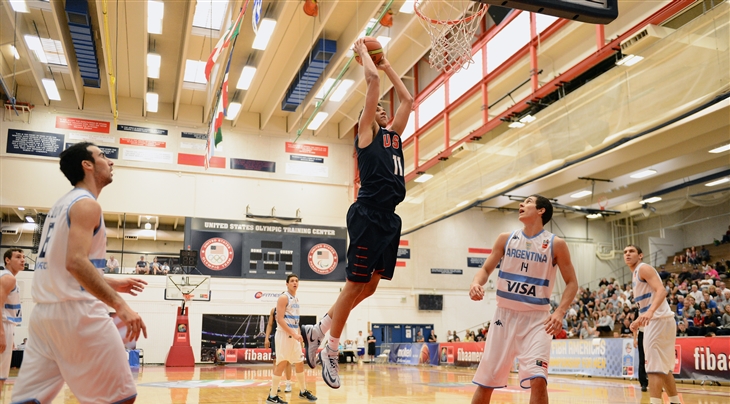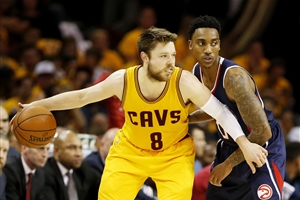
Unofficial "Rules for success at a youth championship”
SAN JUAN (William Rosario's Somewhere in the Americas) - The 2015 FIBA Americas U16 Championship is coming up next week in Bahia Blanca, Argentina and I'm really looking forward to meeting the new class of future superstars of the international game.
It's always cool to enter the arena for the first time to catch a glimpse of a 15-year old Jabari Parker or Jahlil Okafor and wonder at the endless possibilities of the kid's career just a few steps down the road.
Bahia Blanca is a character in this 2015 edition. It is simbolic enough to give it a special kind of backdrop when one thinks about this being Manu Ginobili's hometown and the fact that he has retired from international play at the same time a bunch of kids from eight countries will be breathing the same air he once did before becoming the greatest Latin American player of all-time. Will I look back in 10 years to write a column about how one of these kids got Ginobili's super powers when he played at this U16 in Bahia Blanca? Who knows?
The thing is that I've been waiting for this championship to give me the appropriate context to publish something I've been putting together after working so many youth competitions in the last five years…my unofficial "Rules for success at a youth championship".
Let's go through them.
1. Play to win, but don't have it as a priority
I've talked about this before and my stance has not wavered in the least. The main focus of a youth championship should not be about winning. Expectations, which have become the name of the game for coaches at the pro and national team level, have crept up into the youth tournaments. Now, the teacher part of the equation for coaches has been outweighed by the fact that most of them are just afraid of having a bad showing to where they can no longer be considered for other assignments. Youth tournaments should be about discovery. They should be about assessing talent and giving those young players that have the most potential the time on the court and the experience to become the best that they can be at the end of the road.
2. Can I see a through-line?
The national team program should have a consistent philosophy. I love watching a youth national team play in the same kind of way that the senior national team plays. It creates an identity from the beginning that leaves no room for improvisation in everybody's road to development. Argentina is a beautiful example of this. When you see Argentina on the court, it doesn't matter if it's a youth or adult team, you can see there's a through-line in the way they behave on both sides of the game. When you see the USA, you can see the same kind of attention to detail being reinforced at every level. The discipline this creates for everybody involved is priceless and can sustain any kind of personnel change.
3. The No-Parent Zone
If you are a parent and you feel the need to scream at your kid every time he is on the court, do yourself a favor and go home. We don't need kids with great potential quitting our game because of irrational pressure. This is a basketball game - a GAME. There's not a life and death situation going on here.
4. Everybody needs a quarter
In a youth championship there should be no seven-man rotation, or even an 11-man rotation. If, just to give an example, you're from Mexico and you bring a kid to Bahia Blanca, thousands of mile away from home, to sit on the bench because you suddenly woke up and felt you had a Doc Rivers-epiphany of only using seven players to win… then you are not fit for this job. You never know how much of an impact playing that last kid on the bench at the international level is going to have on his career. Everybody should play at least a quarter, every game.
5. Make it a "Jazz set"
Please, don't try and convert guards to play at the center position just because they are the tallest kids on your teams. You are stifling their growth. That 6ft 4in (1.93m) kid that can dribble and shoot from the outside should play every position. Let paint players be guards, and guards be paint players. Experiment, create a flexibility to your future and adaptation will be way easier.
6. Look like a team
This one comes directly out of this wonderful Julio Lamas (former Argentina national team coach) quote: "A team, apart from playing like a team, should look like a team". I love it. It gives them a subtle sense of discipline, unity and purpose that is oh so important moving forward. There's nothing worse than entering an arena to find a team full of kids practicing with a LeBron James or Kevin Durant jersey. There should be a fine for the coach and the national federation for letting this happen. I'm serious!
7. Don't let the USA scar you, let them inspire you
The USA's invincibility in these youth tournaments should not be humiliating to those that lose by 90 points. Instead, it should lead to more and more investigation into how they do it. Apart from the incredible biological-in-numbers advantages the country has, there is a structure in place that allows their incredible talent pool to happen. And I'm amazed there aren't more countries at least trying to emulate it. Investigate, find out how their school program works, how they stay in touch with the kids throughout their career even bringing them over to train in off-years, and what is USA Basketball doing to improve their youth program. At least try and copy it. Find inspiration in a blow-out defeat.
8. Small victories are the best!
This one brings it full circle because really, sometimes the best thing to do when you play in these youth tournaments is to not look at the scoreboard. Disparity against teams like the USA can drive a win-centric coach crazy. But I've seen those that simplify it and take it possession-by-possession, and it's great. You can see them applaud a defensive stop and congratulate a player after a nice pass with a grace that will make you forget that the game ended with a margin of defeat of 60 or 70 points. Now, that's what I call coaching.
It's funny about lists. Comedian George Carlin talks about the Ten Commandments and why there are specifically 10, and not eight like this list or nine.
"Ten sounds official. Ten sounds important. Ten is the basis for the decimal system. It's the decade. It's a psychologically satisfying number. The Top 10, the 10 most wanted, the 10 best dressed. So having 10 commandments was really…a marketing decision," he said.
And he's right, something is pushing me to get to 10... nah, let's end it here.
William Rosario
FIBA
FIBA's columnists write on a wide range of topics relating to basketball that are of interest to them. The opinions they express are their own and in no way reflect those of FIBA.
FIBA takes no responsibility and gives no guarantees, warranties or representations, implied or otherwise, for the content or accuracy of the content and opinion expressed in the above article.

















